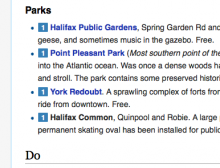These numbers should not all be the same:
Each number on the page should be different, so that the correct entry can be found in the map. (The numbers are created by adding longitude and latitude to any listing template, e.g., {{see}}.)
This screenshot is take from https://en.wikivoyage.org/wiki/Halifax#Parks
